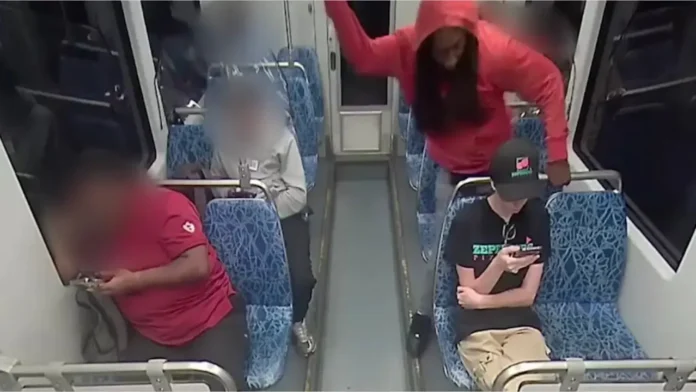A Shocking Crime Caught on Camera
The fatal stabbing of Iryna Zarutska, a 23-year-old Ukrainian refugee, on Charlotte’s Lynx Blue Line light rail has shaken both local residents and the nation at large. Captured on surveillance footage, the attack was swift, brutal, and seemingly without provocation. The video, which spread quickly through news networks and social media, showed the victim seated on the train when she was suddenly assaulted by a man later identified as Decarlos Brown Jr., 34, who repeatedly stabbed her in the neck and torso.
Passengers rushed to escape the train, while a few attempted to render aid, but Zarutska succumbed to her injuries before emergency responders arrived.
The Victim: A Life of Hope Cut Short
Zarutska’s story had resonated deeply within the Charlotte community. Fleeing the war in Ukraine in 2022, she arrived in the United States under refugee protections and had been working steadily to build a new life. Friends described her as ambitious, kind, and deeply committed to making the most of her new beginning. She had dreams of pursuing a career in veterinary care and had recently taken a job at a local pet clinic.
For many, her killing has not only symbolized the vulnerability of women and immigrants in urban America but also highlighted the struggles refugees face in starting anew.
The Suspect: A Troubled Past Ignored
Authorities revealed that Decarlos Brown Jr. had a long criminal record, including assault charges, theft, and multiple run-ins with law enforcement. Reports also indicated that Brown struggled with untreated mental illness, raising questions about why he was free and unsupervised at the time of the attack.
Critics of the judicial system pointed to his release under cashless bail and inadequate mental health oversight as a failure of public policy. Brown is now facing charges of first-degree murder at the state level, while federal prosecutors have also stepped in, citing laws governing violent crimes on mass transit systems.
Outcry from Leaders and Citizens
The stabbing prompted swift responses from officials. North Carolina Governor Josh Stein called the crime “appalling and unacceptable,” while Charlotte Mayor Vi Lyles pledged a full review of transit security. Both emphasized the need to restore public confidence in the city’s light rail system, which serves thousands of daily commuters.
Nationally, the attack became a lightning rod for political debate. Some leaders called for tougher bail laws and more federal involvement in transit security, while others pointed to systemic issues of homelessness, mental health care, and economic inequality as underlying causes of rising urban violence.
Former President Donald Trump seized on the incident to criticize Democratic leadership in urban areas, framing it as evidence of “lawless cities” and failed criminal justice policies. Critics, however, warned against politicizing a human tragedy and stressed the need for bipartisan solutions.
Crime in Major U.S. Cities: A Broader Context
This incident has reignited discussions about violent crime trends in major U.S. cities. While some data suggests that overall violent crime rates have declined slightly in 2025 compared to pandemic-era peaks, high-profile incidents like Zarutska’s killing capture public attention and feed perceptions of urban danger.
Public transit systems in particular have been under scrutiny. Cities like New York, San Francisco, and Los Angeles have seen spikes in transit-related assaults, leading to increased patrols and new safety measures. Charlotte’s tragedy has now thrust the city into this national conversation.
Mental Health, Bail Reform, and Systemic Gaps
The Charlotte stabbing has become a case study in the intersection of public safety, judicial reform, and mental health policy. Advocates argue that the suspect’s history of instability should have triggered mandatory psychiatric evaluation and long-term care, rather than repeated short-term releases.
At the same time, the debate over bail reform—intended to prevent low-income individuals from being jailed for minor crimes—has intensified. Critics say the system sometimes enables dangerous repeat offenders to return to the streets, while supporters stress that reform should not be abandoned because of failures in implementation.
Community Mourning and Fear
Charlotte residents held vigils for Zarutska, leaving flowers and candles at transit stations in her memory. Local immigrant organizations described the killing as especially painful for refugee families who fled violence overseas only to encounter it again in their new home.
Commuters, meanwhile, expressed fear and frustration over safety on the light rail. Calls have grown for better surveillance, armed transit officers, and faster response systems to ensure that passengers feel secure.
Why This Tragedy Matters
The killing of Iryna Zarutska is more than an isolated act of violence—it is a reflection of broader issues facing American cities:
- Gaps in mental health treatment and monitoring of high-risk individuals.
- Ongoing tensions in bail reform policies and public safety.
- Increasing concerns over transit security nationwide.
- The struggles of refugees and immigrants who often face unique vulnerabilities.
As policymakers, law enforcement, and community leaders debate next steps, this case underscores the need for urgent reforms that balance compassion with public protection.




